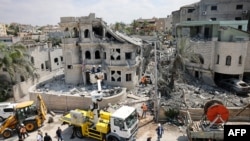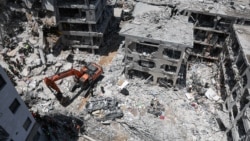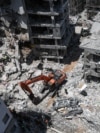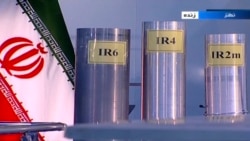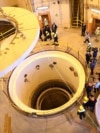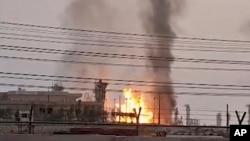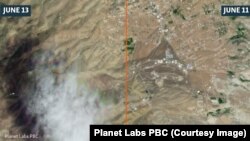President Donald Trump said the United States is not involved in the conflict between Iran and Israel, but as the archenemies launched a fresh barrage of air strikes at each other, he admitted it's "possible" that will change.
Speaking in an interview with ABC News on June 15, Trump was asked if the United States will get more involved in the conflict that erupted three days earlier.
He responded: "We're not involved in it. It's possible we could get involved. But we are not at this moment involved."
Trump told reporters as he left for the Group of Seven summit in Canada that the United States will continue to support Israel but declined to say if he asked Israel to pause strikes on Iran. He added that he still hopes for a deal to end the fighting.
"I think it's time for a deal and we’ll see what happens. Sometimes they have to fight it out, but we’re gonna see what happens," Trump said.
Fresh blasts rocked Tehran through the afternoon on June 15.
Iranian news agencies reported one strike in the area of Vali-e Asr Square in the city center, and another in a neighborhood named for the air force, which has its headquarters there.
Earlier in the day, Israeli strikes hit Iran’s Defense Ministry, a natural gas processing plant, and two oil refineries among other targets, according to authorities and Iranian media reports.
Iranian state television reported that subway stations and mosques would be made available as bomb shelters.
In Israel, sirens went off across much of the country again around 4 p.m., warning of what would be Iran's first daytime aerial assault since the conflict began on with Israel's initial, surprise strikes targeting Iranian nuclear and missile facilities on June 13.
Amid fears the conflict could broaden across the Middle East, Yemen's Houthis said on they fired missiles at Israel in coordination with Iran.
Nuclear Talks Canceled
The outbreak of air strikes forced the cancellation of a new round of nuclear negotiations between the United States and Iran, planned for June 15 in Oman.
Iran had described the talks as "meaningless" after the Israeli air strikes, and Foreign Minister Abbas Araqchi told state media that continuing the negotiations would be unjustifiable.
Araqchi on June 15 accused Israel of seeking to sabotage the talks, which according to him could have opened the way to an agreement.
He also said Israel's attacks had the support of the United States and that Iran was acting only in self-defense against foreign “aggression.” Araqchi added that if the Israeli strikes on Iran stop, then “our responses will also stop."
Explosions also were heard in Tel Aviv and Jerusalem throughout the morning hours, with the Israeli military urging citizens to seek cover in shelters following waves of Iranian drone and rocket strikes that killed at least 13 people and injured some 200 people since June 13.
Rescue crews on June 15 said at least 14 people were injured when an Iranian missile hit a home in northern Israel. The Magen David Adom emergency services provider later said a woman in her 20s had died.
Another strike in the Shephelah region of central Israel killed three people, including a 10-year-old boy, and injured about 100 others, officials said.
State-run Iranian news agency Tasnim -- which generally speaks for Iran's powerful Islamic Revolutionary Guards Corps (IRGC) -- on June 15 confirmed that Tehran had launched a new wave of drones and missiles at Israel.
A military spokesperson for Yemen's Houthis, Yehya Sarea, said in a televised address on June 15 that they had targeted the Israeli city of Jaffa a with several ballistic missiles in the previous 24 hours.
It was the first time an Iran-aligned group has publicly announced joint cooperation on attacks with Tehran.
More Strikes To Come
In Iran, meanwhile, a journalist for German news agency dpa reported seeing citizens lined up for miles in Tehran seeking to fuel their vehicles ahead of efforts to leave the city amid renewed Israeli air strikes.
“Tehran is burning," Israeli Defense Minister Israel Katz wrote in Hebrew on social media.
Iran had earlier said that 78 people were killed and more than 320 injured there on the first day of Israel's attacks, and scores more on the second, including some 60 when a 14-storey apartment complex was brought down by a missile in Tehran. Iranian state TV said 29 of those killed in the apartment block strike were children.
The Iranian Health Ministry provided an update on June 15, saying 224 people have been killed since Israel’s attack began on June 13. Spokesman Hossein Kermanpour said that 1,277 other people were hospitalized and more than 90 percent of the casualties were civilians.
In the initial waves of attacks, Israel had appeared to avoid striking Iran's energy infrastructure amid rising world fuel prices, but Iran's Oil Ministry early on June 15 said Israeli strikes had hit two fuel depots in Tehran.
Earlier, Iranian state media said fire broke out at the South Pars gas field in the southern Bushehr Province during an Israeli attack.
In a video address, Israeli Prime Minister Benjamin Netanyahu said: "In the near future, you will see Israeli Air Force planes over Tehran. We will attack every location and every target of the Ayatollah regime."
In a social media post on June 15, the Israeli military issued an evacuation warning to Iranians residing near weapons facilities, signaling what could be a further widening of the Israeli campaign. Around noon local time, explosions were heard again in Tehran.
Also on June 15, Iranian General Esmail Kosari said Tehran was considering whether to close the Strait of Hormuz, which is one of the world's most important shipping routes, with about a fifth of the world's oil passing through it.
Ordinary People Describe Fear, Agony
As the missiles hit residential areas causing deaths, destruction, and panic, ordinary people in both Israel and Iran described the fear and anxiety they experienced.
A Tehran resident, who did not give her name, told RFE/RL’ Radio Farda on June 15 that she and her family were woken up at around 3 a.m. by “the sound of a very loud explosion” that “shook” their home.
“The explosions kept coming one after the other. The building was shaking. It caused a fear in us,” woman said.
“Our normal day-to-day life is effectively disrupted. We cannot sleep at night. We’re trying to keep calm, but it’s really difficult,” she added.
Another woman in Tehran described how her young niece “keeps crying and asks me if we’re going to survive.”
An elderly Tehran resident told Radio Farda that the strikes remind her of the “heavy bombardments” she had witnessed during the Iran-Iraq war in the 1980s.
“It is very scary…. It's all coming back to me, and I am very stressed,” the woman said.
Back-And-Force Air Strikes
The back-and-forth attacks started with a massive, surprise air assault by Israel on Iran's nuclear and missile facilities on June 13 as well as more targeted attacks against top generals and several nuclear scientists.
Among the sites were hit in Iran was the IRGC command site in Tehran, according to Iranian state TV. The strike killed the commander of the corps, Major General Hossein Salami, Iranian officials said.
State radio reported June 14 that two more top generals had been killed: Gholamresa Mehrabi and Mehdi Rabani, who are senior members of the armed forces' general staff, bringing the number of top military officials reportedly killed to eight.
Israel's military also claimed that its strikes had killed "nine senior scientists and experts" involved with the country's nuclear programs.
The violence has pushed the entire Middle East -- already on edge due to Israel's 20-month-long war in Gaza -- to the cusp of all-out war.
British Prime Minister Keir Starmer called for a de-escalation in the conflict, but he also said additional RAF jets were being sent to the Middle East after Tehran threatened to target British, French, and US bases if those countries helped Israel to prevent Iranian strikes on Israel.
Separately, Turkish President Recep Tayyip Erdogan's office said he had spoken with Iranian President Masud Pezeshkian on June 14 to condemn the Israeli attacks on Iran.
“Our president stated that Israel’s attacks are a clear violation of international law, aiming to draw the entire region into the fire, and that Netanyahu is attempting to sabotage the nuclear negotiation process with the attacks,” the statement said.
"Turkey is closely following the developments regarding the possibility of a nuclear leak at the facility in Natanz and that the only solution to the nuclear dispute is diplomatic processes,” it said.
Netanyahu has said his fight was not with the Iranian citizens and called on them to remove the “brutal dictatorship that has oppressed you for 46 years.”




